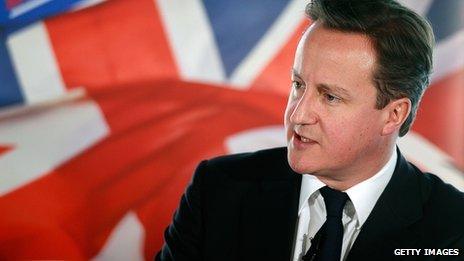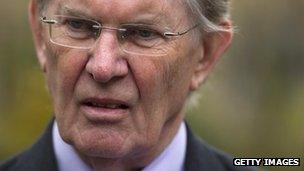This Eurosceptic Isle - The rise and rise of British Euroscepticism
- Published
- comments

When I first arrived at Westminster in the 1990s, as a young political reporter for The Times, there was one man who you could not afford to ignore.
Night after night we would stand in the press gallery of the House of Commons at 10pm and watch as this MP and his small band of brothers tested John Major's dwindling majority to destruction as they opposed the Maastricht and other treaties.
In later years he carved a more lonely furrow, banging on about Europe when the rest of Parliament had moved on. As a member and then chairman of various committees, he has spent years scrutinising the detail of legislation pouring in from Brussels while other MPs lost interest.
To his opponents, he is a Eurosceptic bore who would blame the European Union for the weather if he could. To his friends, he is an heroic obsessive, the Eurosceptic conscience of the Conservatives who holds each and every Tory leader to account.
And yet so Eurosceptic has the Conservative party become that Bill Cash is now considered to be in the party's mainstream. And that is not my judgement but David Cameron's.
Mainstream view
In a programme about the rise of Euroscepticism on BBC Radio 4 on Monday at 20:00 GMT, Mr Cash tells me of a recent encounter with the prime minister where they were discussing his promise of a referendum on Britain's membership of the Europe Union.
He says: "David Cameron actually said to me in a meeting I had with him a few weeks ago, 'Bill, you're mainstream'."
For me, that comment illustrates better than any other the change that has come upon the Conservative Party over the last decade in which Euroscepticism has grown from a minority sport to a wider political force.

Conservative MP Bill Cash is known for his Eurosceptic views
Where once there was a battle between Tory Eurosceptics and pro Europeans, most Conservative MPs would now say they were Eurosceptic in some shape or form. Where once Tory associations pushed their MPs to be more hostile to Europe, many have now had the chance to choose more Eurosceptic candidates. And where once Conservative Eurosceptics defected to UKIP, there is now traffic the other way as the high profile defection of one of UKIP's MEPs, Marta Andreasen, proved last week.
But it is not just the Conservative Party that has changed. The rest of the body politic has become more accustomed to Euroscepticism.
Think of it - a serving British prime minister has promised an in out referendum on Britain's membership of the EU, opening the door to Britain taking powers back from Brussels or leaving the European Union altogether. And yet the sky did not fall in, the pound remained steady and the continental upper lip stayed admirably stiff. The same promise 10 years ago would have provoked uproar in the House of Commons, spooked the financial markets and dismayed the rest of Europe.
'Straight forward Europhobia'
The question is why? Tonight in This Eurosceptic Isle, I try to draw together a few answers.
In no particular order, these are just some of the themes that emerge: the selection of more Eurosceptic Tory MPs; the growth of UKIP as the anti-politics vote leaves a pro-European party (the Lib Dems) and joins one that opposes the EU; the silence of pro-Europeans who have let their side of the argument fall by default; the arrival of immigrants in the UK from the Eastern European reaches of the EU; the growing awareness of EU in everyday life; the impact of the eurozone crisis that has tarnished the EU brand and put wind in the Eurosceptic sails; and the changing international geopolitics that says we don't just have to look to Europe for markets, ideas and culture.
All that analysis with interviews from the likes of London Mayor Boris Johnson, George Eustice MP, the anti-euro campaigner Lord Leach, Charles Grant of the pro-European Centre for European Reform thinktank, the former Labour leader Lord Kinnock, and the former Labour cabinet minister, Lord Mandelson.
Just to give you a taster, here is Lord Mandelson on the role of the media: "It is very striking that the combined effect of News International, Daily Mail newspapers, the Telegraph, but in the middle of that the figure of Rupert Murdoch more importantly than any other has driven the media to a more hostile position than it was when we went into the then European Community in the 1970s.
"There are now newspapers that are just propaganda rags, there is no balance, no even-handedness. It is just straight forward Europhobia. It is bound to have an effect."
This Eurosceptic Isle will be broadcast on BBC Radio 4 at 20:00 (GMT) on Monday, 25 February 2013. You can listen to it on iPlayer after broadcast